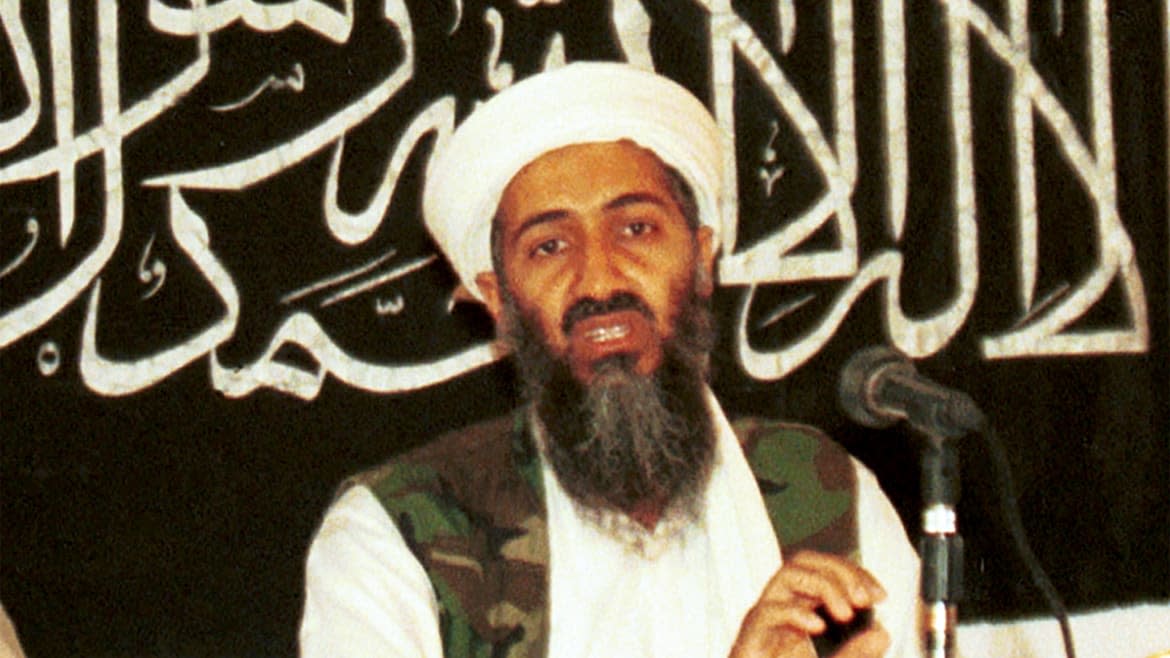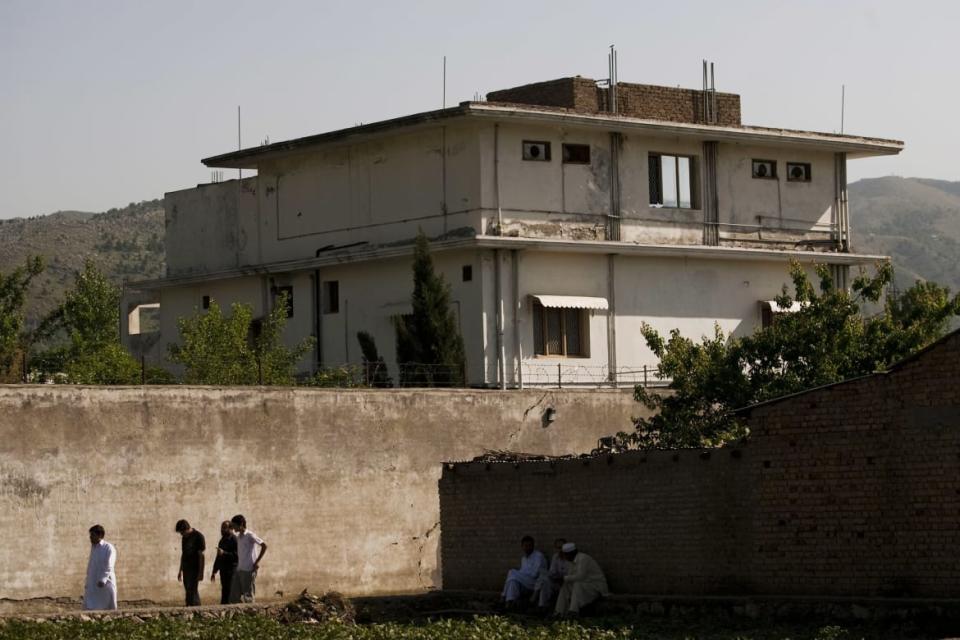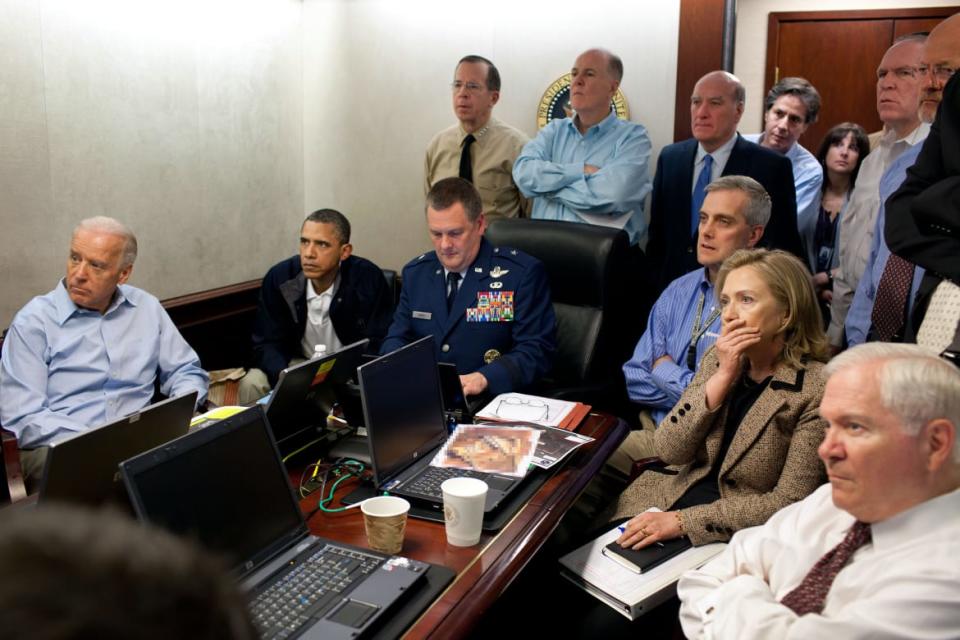Was Osama bin Laden Sending Coded Messages in Porn?

We’ll likely never know exactly how Osama bin Laden personally reconciled his many jarring contradictions, but we can be reasonably certain he would have loathed Bin Laden’s Hard Drive, National Geographic’s deep dive into the cache of digital and written materials that were confiscated by the Navy SEAL team that stormed his compound in Abbottabad, Pakistan, on May 2, 2011, and ended his life on the orders of President Barack Obama. For a man who prized his secrecy, this public disclosure of his most private thoughts and fixations would have been the height of embarrassment—especially since, as the TV special reminds viewers, included in that impounded “treasure trove” was a sizeable amount of pornography.
The revelation that bin Laden had a lot of smutty videos and images on his hard drives isn’t new; it was first reported by Reuters back in 2011, and has since been described by officials as “fairly extensive.” Bin Laden’s Hard Drive host Peter Bergen—a CNN national security analyst who, in 1997, was the first Western journalist to interview bin Laden on TV—says that “a significant amount of pornography” was retrieved by the Navy SEAL squad. Alas, his hour-long TV special (airing Sept. 10) doesn’t provide any more details about precisely what kinky craziness bin Laden was watching—or, for that matter, whether he was watching it at all. Although porn was definitely on his drives, the actual consumer of this X-rated stash remains something of a mystery. And the fact that many of bin Laden’s computers had been previously owned by others leaves some doubt as to whether or not he was even the one who compiled it in the first place.
CIA Agents Reveal How Bill Clinton Stopped Them From Killing bin Laden and Preventing 9/11
More interesting is Bin Laden’s Hard Drive’s suggestion that maybe the terrorist leader’s sex videos (whose origins are unknown, since he didn’t have an internet connection) were canny tools used to communicate with acolytes. According to his letters, bin Laden feared using email as a means of spreading his message, because encryption couldn’t be trusted; this is why most of his interaction with the outside world occurred via couriers. However, the idea is raised by Bergen’s show (directed by Aaron Kunkel) that the al Qaeda bigwig might have been hiding encrypting instructions in his pornographic files—a devious means of avoiding detection by marrying murderous commands to the very sort of sinful content he purportedly decried.

People walk past Osama Bin Laden's compound, where he was killed during a raid by U.S. special forces, May 3, 2011, in Abottabad, Pakistan.
Then again, as forensic psychologist and CIA consultant Reid Meloy states, it could have just been that, for all his outward claims of humble, righteous piousness, bin Laden was a normal guy who occasionally wanted to get his rocks off, since “biology trumps ideology.” While conclusive answers on this subject aren’t forthcoming, there’s no doubt that this X-rated discovery speaks to bin Laden’s overarching hypocrisy, which quickly becomes the main takeaway from Bin Laden’s Hard Drive. At every turn, videos, media footage and correspondence found on the killer’s hard drives underline his two-faced nature.
For example, there’s much talk from experts and former comrades about bin Laden’s humility. A devout Muslim who allegedly spoke softly, loved and doted on his family, and condemned arrogance in his followers and compatriots, bin Laden affected an air of being an old-school prophet who was deferential before the Lord and the world. Yet as Bin Laden’s Hard Drive reveals, his computers also contained copious news reports and documentaries about himself, as well as multiple takes of prerecorded speeches in which he demanded perfection. For all his supposed modesty, he was a raging narcissist who obsessed about how he depicted himself, and was depicted—to the point that he carefully groomed his own image, replete with dying his beard to make himself appear more youthful.
Such dualities abound in Bin Laden’s Hard Drive. Bin Laden feigned piety while massacring thousands in God’s name. He had a habit of calling up his TV’s channel guide whenever a female newscaster appeared on-screen (the better to not gaze upon women), and yet heavily relied on his wives (two of whom had PhDs) to help him write and edit his videotaped sermons. He cared deeply about nurturing his children and grandchildren as a means of creating a more perfect future, and yet—as evidenced by a home movie purportedly shot by his grandson of a bird being shot and then callously kicked and prodded—bred them to be violent and vicious. And he was a man who believed he was changing the world for the better, only to carry out attacks that ruined untold lives, begat brutal military conflicts, and generally made the globe less safe for everyone, including himself, his indoctrinated loved ones, and his people.

President Barack Obama, Vice President Joe Biden, Secretary of State Hillary Clinton and members of the national security team receive an update on the mission against Osama bin Laden in the Situation Room of the White House May 1, 2011, in Washington, D.C.
Bin Laden’s Hard Drive exposes these incongruous elements of the madman’s personality, ethos and behavior, but since they’ve already been well-documented over the past two decades, it falls short on providing real insight into his heart and mind. There simply aren’t many bombshells to Bergen’s non-fiction effort, which trots out erudite talking heads who can do little more than articulate commonly-held opinions, or somewhat flimsy conjecture about the meaning of bin Laden’s hard drive content. Even a discussion about the irony of bin Laden’s kids being taught to revile the West while using Western products to entertain themselves and disseminate their dad’s message proves about as novel or enlightening as the idea that he was victimizing these children by brainwashing them to become martyrs.
Ultimately, there’s just not that much to Bin Laden’s Hard Drive; like so many TV news specials of its kind, it promises to deliver tantalizing never-before-seen eye-openers, and then largely replays the same few videos while scholars, activists and intelligence officials say mundane things we’ve all heard before. That said, in clips of his Abbottabad compound—a barren, wretched looking sty full of garbage, chickens, cows, and more garbage—and his attendant prison-like day-to-day of seclusion, homeschooling, and porn consumption, the bin Laden presented here does emerge as a figure ahead of his time, in at least one respect: namely, as someone living the type of dreary, claustrophobic quarantined life that’s now the norm in 2020.
Get our top stories in your inbox every day. Sign up now!
Daily Beast Membership: Beast Inside goes deeper on the stories that matter to you. Learn more.

